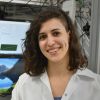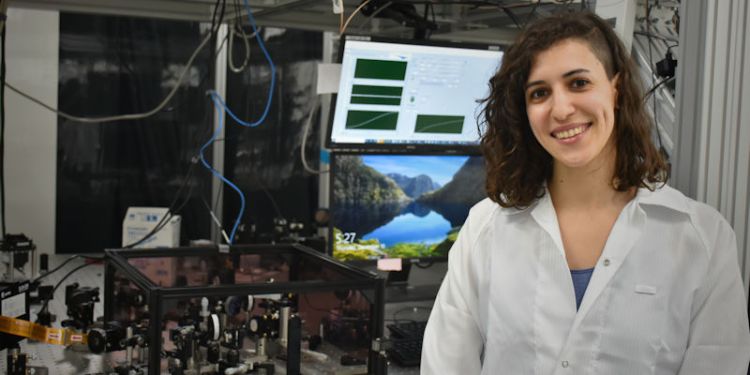
Julia Gala de Pablo
- Course: Physics PhD
- PhD title: Biochemical phenotyping of live single cells using confocal Raman spectroscopy
- Year of graduation: 2019
- Job title: Postdoctoral Researcher
- Company: University: The University of Tokyo
- LinkedIn: https://www.linkedin.com/in/juliagaladepablo/

Julia analyses the biochemical composition of hundreds of cells per second under flow to better understand what makes some of them different
Julia Gala De Pablo graduated from her PhD in Physics at the University of Leeds and soon after pursued a three-month postdoctoral position in the Molecular and Nanoscale Physics research group. Professor Steve Evans supervised Julia during her studies, for which she researched single cell analysis using the technique Raman spectroscopy. Julia applied her research to investigate colorectal cancer and then bacterial biofilms, respectively.
After this, Julia obtained a Japanese Society for the Promotion of Science (JSPS) fellowship to work at the University of Tokyo for two years in Professor Keisuke Goda’s laboratory. She has been now living and working in Tokyo for more than a year.
Julia said: “It was great to have a chance to apply my expertise on a short postdoc after my PhD in Leeds. My PhD had been on Raman spectroscopy on colorectal cancer, and this postdoc was on Raman spectroscopy on bacterial biofilms, which was an exciting and refreshing new topic.”
Using ‘Raman flow cytometry’ at the University of Tokyo
Since she first studied science, Julia has been interested in single cell microscopy and analysis. She explained what she finds most interesting about the topic.
“I am interested in how single cells work and what make them different from one another,” said Julia. “For instance, within a tumour, why does therapy not kill all the cells, but some of them develop resistance? Within a biofilm population, how do each of the cells specialise and why do they behave differently when treated with an antibiotic?”
“I am currently doing Raman flow cytometry at the University of Tokyo, where we can analyse the biochemical composition of hundreds of cells per second under flow to better understand what makes some of them different.”
She continued: “All my research has always been in the interface between biology and physics, so I am responsible for both cell growth for my samples and technical support of my analysis system, often involving laser alignment and system technical updates. A big part of my job consists of data analysis and experimental planning. Additionally, results dissemination by writing journal articles or attending conferences is essential.”
All my research has always been in the interface between biology and physics, so I am responsible for both cell growth for my samples and technical support... often involving laser alignment and system technical updates.
Julia added: “In Leeds, Steve and I had a lot of interests in common. I was interested on single cell analysis, and he was the one to introduce me to Raman spectroscopy as an analytical technique.
“Here in Tokyo, I was interested in bringing Raman spectroscopy to a higher throughput and that was a fantastic fit for Keisuke Goda’s lab, where I am working as a part of Kotaro Hiramatsu’s team working on Raman flow cytometry.”
Learning new skills through a PhD
Julia’s PhD was funded with an EPSRC scholarship, and her postdoctoral programme at Leeds was funded by an alumni scholarship. Her current fellowship is funded by the Japanese Society for the Promotion of Science.
Julia said: “My PhD not only taught many scientific technical skills, but also taught me how to plan and do research, troubleshooting, how to write journal articles and fellowship proposals and how to do effective presentations.”
My PhD not only taught many scientific technical skills, but also taught me how to plan and do research, troubleshooting, how to write journal articles and fellowship proposals and how to do effective presentations.
She continued: “By reading hard scientific literature, I learnt how to use any available resources to teach myself about any topic. Additionally, I learnt how to organize scientific meetings and engagement events and how to work as a team. Overall, I have gained a ton of skills that are already helping me in my scientific career.”
Julia actively took part in enrichment activities at the University and found her peers and colleagues to be very supportive. “My PhD colleagues were great,” said Julia. “I joined some of the sports classes at the Union and had a gym membership at the Edge. I also participated in two instances of Pint of Science, organized by postgraduates for science engagement in Leeds pubs. I was the postgraduate representative for a year, and helped in the organization of the physics Postgraduate Symposium at Leeds.”
Choosing Leeds
During her undergraduate physics degree, Julia first came to Leeds for the Erasmus scheme. She obtained a summer scholarship at the Molecular and Nanoscale Physics group following her degree, and it was there she met Professor Evans.
Julia said: “The summer school was a great opportunity to learn about the research taking place at Leeds and I really enjoyed that summer. When I finished my Bachelor’s degree in Spain and I decided to do a PhD, I chose Leeds because I knew it was a great fit for my research interests.”
She added: “Leeds is a vibrant student city, where prices and housing are very affordable, meaning that the PhD stipend goes a longer way than in other UK cities. It is also quite close to the Yorkshire Dales, and I love going outdoors, so that was a big plus for me.”
Find out more
Visit our research degrees pages learn more about our postgraduate community.

